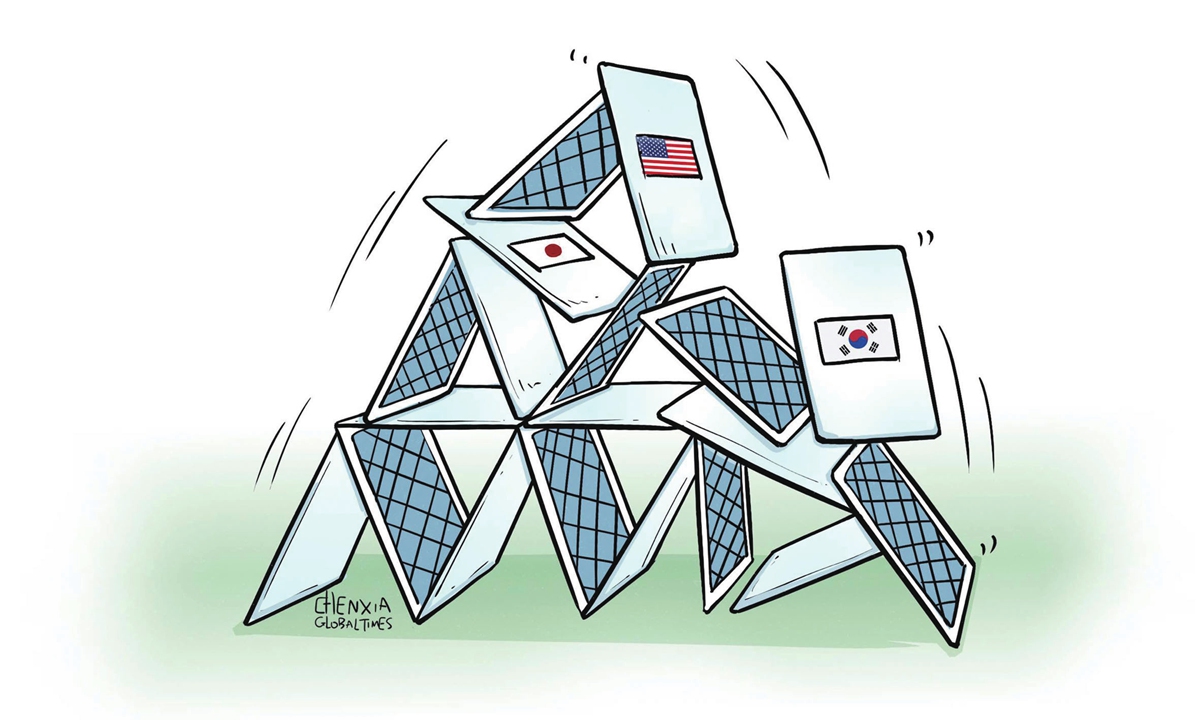
Illustration: Chen Xia/GT
The US, Japan and South Korea is reported to hold a trilateral summit at Camp David, the US presidential resort, on August 18. The three leaders are working to establish regular channels of communication and formulate measures to enhance cooperation. Washington is pushing for a historic statement at the summit, and the US wants "Japan and South Korea to agree that each nation has a duty to consult the others in the event of an attack." In this way, Washington is pulling South Korea and Japan into a trilateral alliance to bolster deterrence against China.The effort to woo Tokyo and Seoul is the latest step in the Biden administration's strategy to reinforce the Indo-Pacific alliance, along with other US-led Indo-Pacific frameworks such as the QUAD and AUKUS.
Will the bilateral alliance between the US and Japan and the one between the US and South Korea develop into a trilateral alliance in the near future?
The relationship among the three countries will become closer in a short period of time. However, due to various practical challenges such as historical contradictions, the interests of various parties and the divergence of interest demands on China, the trilateral security cooperation mechanism will not evolve into a formal trilateral alliance for the time being, but is essentially more of a trilateral partnership or trilateral security cooperation.
The reason why the trilateral alliance will not be realized in the short term is mainly influenced by the following four factors:
First, anti-Japanese sentiment in South Korea is the mainstream political culture and an important measure to improve the prestige of its government. The level of security cooperation among Japan, South Korea and the US will depend on the relationship between Japan and South Korea, and the US will act as a bridge between Japan and South Korea. In addition, due to geographical conditions and economic interests, South Korea's economy is highly dependent on China, and South Korea is the most reluctant to get involved in economic competition with China. Therefore, in the process of "decoupling from China," South Korea is the short board of the trilateral relationship.
Second, South Korea is reluctant to get deeply involved in the Taiwan question. South Korea's security concerns mainly come from North Korea.
Third, wooing South Korea and Japan is only an integral part of the US strategy toward China, not its strategic focus. Each country has its own strategic priority and can't fully cooperate with the US' deterrence against China. Japan finds Russia's military activities in the Indo-Pacific region are "of strong security concern," and it hopes to form strategic advantages over Russia through multi-party diplomatic efforts in its territorial disputes with Russia. South Korea's strategic rival is North Korea. Thus, there are practical differences in the strategic priorities of the three countries.
Fourth, although Japan, the US and South Korea have consensus on Korean Peninsula issues, they hold different views toward China in terms of Indo-Pacific cooperation. Different from the US and Japan, the goal of South Korea is to obtain more trade, technology and military resources from the US through the Indo-Pacific strategy. Moreover, South Korea is a close neighbor of China. China-South Korea relations have a profound impact on South Korea's geopolitical, economic and military interests, so South Korea regards China as a "key partner" in its Indo-Pacific strategy report. The US and Japan's strategy toward China emphasizes competition and even confrontation, while South Korea believes that there is room for cooperation in its relations with China.
Overall, there is still a long way to go for the trilateral relationship between Japan, the US and South Korea to evolve into a trilateral alliance, with South Korea in a subordinate position, while Japan and the US are the core driving force. At the same time, South Korea is relatively passive in the bilateral relations with Japan. Morally, South Korea should take the lead role, but the Yoon Suk-yeol administration's low posture has allowed Japan to gain dominance. Coupled with South Korea's lack of strategic leadership in defense issues, it has been in a passive state in the trilateral relations. Furthermore, the domestic political uncertainty in South Korea further aggravates the difficulty and vulnerability of the trilateral alliance.
The author is an associate professor of the Center for International Politics Research, Shihezi University, Xinjiang. [email protected]
版权声明:除非特别标注,否则均为本站原创文章,转载时请以链接形式注明文章出处。


评论列表
群雄打天下手游果盘版是一款非常精彩好玩的rpg三国卡牌游戏,以三国故事为背景,拥有超级酷炫精美的游戏画面,融合了多种经典的游戏玩法,喜欢的朋友快来2265安卓网点击下载体验一下吧!群雄打天下官方简介群
2024-10-23 19:15【52PK 7月28日消息】如果说今天上午,完美世界竺总与《诛仙2》美女碧瑶的零距离互动让观众咋舌,那么,现在完美展台上,又将上演奇迹的完美!碧瑶仙子再次降临!并与现场玩家一起互动!你想象得到这一切吗
2024-10-23 19:15洪承畴被骂得如此惨,是因为他在历史的关键时刻作出了对自己民族极具破坏性的选择。他的行为不仅仅是个人的背叛,更是对整个汉族文化和民族感情的背叛。这种深刻的文化和民族背叛感,使得他在中国历史上的名声,成为
2024-10-23 18:48这些都是小意思,能给玩家的是个超乎想像的视觉盛宴,有听,有玩,有奖拿!8月劲夏,简单百宝箱给你带来史上最给力的天龙八部活动——天龙达人秀!这里有最动听的天龙剑客激情演唱,有最妖
2024-10-23 18:17